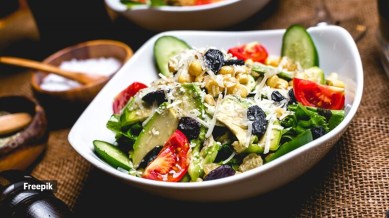📣 For more lifestyle news, click here to join our WhatsApp Channel and also follow us on Instagram
Do salads make you feel bloated? Find out why
Balaji suggested chewing your food thoroughly and being mindful when you are eating to prevent bloating.

Salads have been the go-to meal for Weight Watchers and fitness enthusiasts. Low in calories, and full of fresh leafy vegetables and fruits, these lightweight meal options are nutritional powerhouses. But if salads make you feel bloated afterwards, chances are you are something wrong! Indianexpress.com reached out to health experts to understand where you are going miss, and how to rectify your mistake.
Umang Malhotra, clinical dietitian at Fitelo said that one cup of shredded iceberg lettuce provides around 0.9 grams of fiber, while romaine lettuce offers slightly more at 1.2 grams per cup. Compared to fiber-rich vegetables like spinach (4 grams per cup) or kale (2.6 grams per cup), lettuce falls short in providing significant dietary fiber. However, this does not mean that salads inherently lack fiber—it’s all about the ingredients added to them.
monthly limit of free stories.
with an Express account.
Dietary fiber is categorized into two types, both essential for digestive health:
1. Soluble Fiber: This type of fiber dissolves in water, forming a gel-like substance in the gut. It slows digestion, stabilizes blood sugar levels, and promotes gut health. Good sources include oats, beans, lentils, flaxseeds, and certain fruits like apples and citrus fruits.
2. Insoluble Fiber: This type of fiber does not dissolve in water and helps add bulk to stool, preventing constipation. It is found in whole grains, vegetables (like carrots and cauliflower), nuts, and seeds.
The human body cannot digest insoluble fiber because it lacks the necessary enzymes to break down its complex carbohydrate structure. However, this fiber still plays a crucial role by aiding bowel movements and preventing digestive issues like constipation.
Meenu Balaji, chief nutritionist at Pragmatic Nutrition, Chennai said that there are different types of lettuce used in salads. “Romaine lettuce has a fibre content of 1.3G per 100g, according to USDA. It is a low-calorie leafy green, which is also hydrating. However, feeling bloated after eating salads with lettuce is not due to its low fiber content,” she revealed, listing down some potential reasons:
1. Raw foods are hard to digest: The cell walls are intact when you eat raw salads. Therefore, it takes longer for us to digest them.
2. Not chewing properly: Are you eating your salads in a hurry? Digestion of carbs start in the mouth with the enzyme called as salivary amylase. If you are not chewing food properly, this can lead to bloating.
3. Other digestive issues: If you have any other digestive issues, eating raw salads can make you feel bloated. Although, lettuce is a low gas producing food, its effects might vary from person to person
How can you manage bloating? Balaji suggested chewing your food thoroughly and be mindful when you are eating. “Eat cooked salads using grilled, boiled or roasted vegetables. Always check if you have low stomach acid as this can lead to stomach pain, gas or bloating,” she said.
How can you increase fibre content in a salad?
1. Use whole grains: While grains like quinoa, brown rice or amaranth make for a good salad base.
2. Add leafy greens: Include different varieties of leafy greens like spinach, kale, lettuce or arugula. You can sauté them if don’t want to eat it raw.
3. Mix some cruciferous vegetables: Cabbage, broccoli and Brussel sprouts add in sulphur containing compounds, to support your detox pathways along with fiber.
4. Sprinkle nuts or seeds: Walnuts, flaxseeds, sunflower and pumpkin seeds are fibre rich. They add a crunchy texture and healthy fats to the salad.
📣 For more lifestyle news, click here to join our WhatsApp Channel and also follow us on Instagram